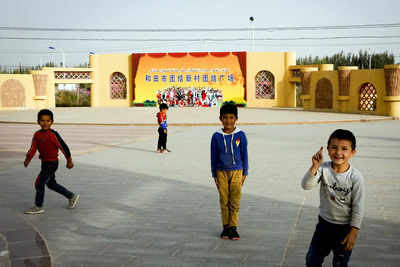2 July 2024: China’s crackdown on Islamic practices, initially focused on the Uyghurs in Xinjiang, has now expanded to include other Muslim minorities, particularly targeting children. According to a recent Foreign Policy report, Beijing’s restrictive measures are being employed against the Hui community in Yuxi, China.
During Ramadan last, Muslims in Yuxi received a troubling WeChat message from the Bureau of Ethnic and Religious Affairs. The notice authorized surveillance of schoolchildren fasting and instructed local authorities to investigate minors’ participation in religious activities.
“The Party Committee, governments, education, and sports bureaus of all levels should investigate the participation of minors in fasting and other religious activities,” the notice stated. It emphasized the separation between education and religion and called for stronger guidance of teachers, students, and youth.
Historical Context
For years, reports have surfaced of mosques being demolished, religious symbols removed, and Islamic practices heavily restricted in Xinjiang, home to around 12 million Uyghurs. Following violent incidents in the 2000s and 2010s, attributed to Uyghur separatists, Beijing intensified its security measures in the region.
Broader Implications
The Hui community, a significant Muslim minority in Yuxi, is now facing similar scrutiny under China’s Sinification campaign, echoing tactics used on Uyghurs in Xinjiang. Restrictions on religious practices and heightened surveillance indicate an expansion of measures targeting Muslim groups throughout China.
Government Policies
In 2018, President Xi Jinping chaired a national conference on education, urging teachers to prioritize party identification among the youth. He emphasized the need to instill loyalty to the Communist Party from a young age, asserting that early mistakes in education could lead to lifelong errors.
China’s assimilation policy aims to integrate ethnic minorities into Han Chinese culture, involving the removal of halal signs, altering mosque architecture, and monitoring religious practices among Hui youth.
Broader Effects
Yuxi’s notice reflects broader efforts to separate minority children from their cultural and religious heritage. Similar measures affect Uyghur, Tibetan, and Inner Mongolian children, aiming to instill loyalty to the Communist Party from a young age.
The Hui community, despite their long history of assimilation, find themselves at the center of a nationwide Sinification campaign that began in 2016. Civil servants in Yuxi are now forbidden from wearing headscarves, and veiled Hui teachers must submit new profile photos without headscarves.
Increasing Restrictions
The policing of Islam in schools, under the guise of separating religion from education, restricts children from participating in religious retreats and activities. This surveillance and restriction have intensified since the 2014 knife attack in Kunming, linked to Uyghur separatists.
Future Outlook
As surveillance techniques from Xinjiang spread to other regions, the Hui’s religious freedoms continue to erode. The increased monitoring and restrictions suggest a growing crackdown on Muslim practices across China, raising concerns about the future of religious and cultural freedoms for all Muslim minorities in the country.
The international community has reacted strongly to China’s actions in Xinjiang, with countries like the United States imposing sanctions on Chinese officials and entities implicated in human rights abuses. Despite widespread condemnation, China denies any wrongdoing, maintaining that its policies are necessary for national security and stability.




